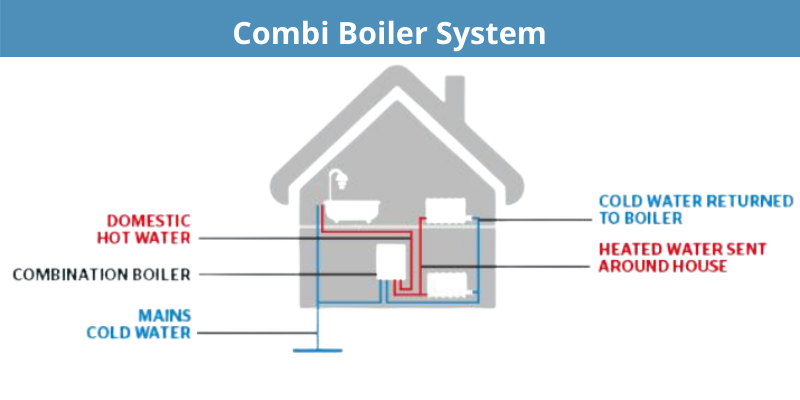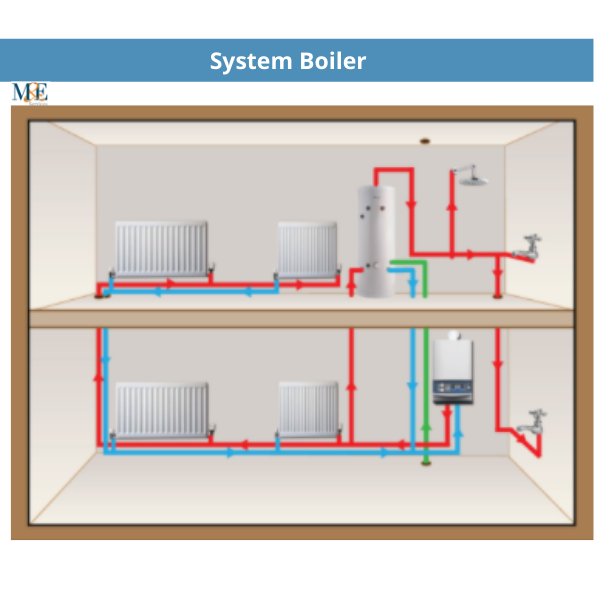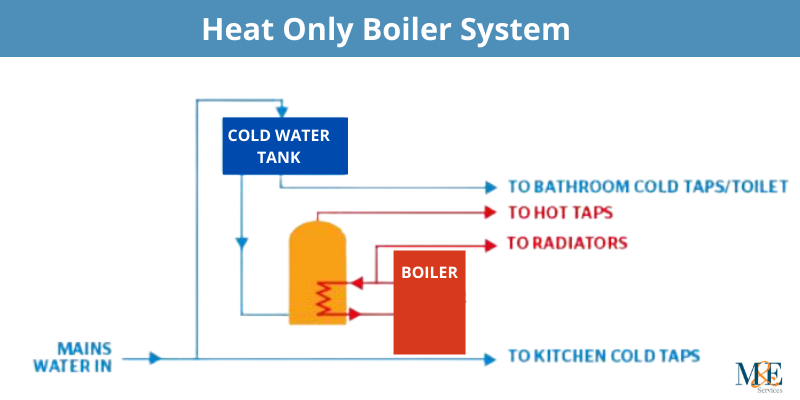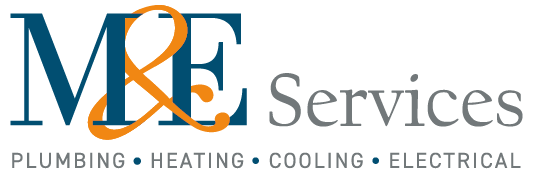What are the different types of central heating systems?
What are the different types of boiler systems? What are the advantage’s and disadvantage’s?
There are fundamentally 3 types of boiler: Combination Boilers, System Boilers and Heat Only Boilers. Let’s look at these in a little more detail.
Combination Boilers (aka Combi Boilers)
This boiler type makes up the largest percentage of boilers fitted in the UK.
What is a Combi Boiler?
A combi boiler is a boiler that provides a “combination” of both heating and hot water.
Combi boilers heat hot water directly from the mains when you turn on a tap, so you won’t need a hot water storage cylinder or a cold water storage tank in the roof space.
How many pipes does a Combi Boiler have?
There are 7 pipes coming off a modern Combi Boiler. These are, heating flow, heating return, hot water, incoming mains water, gas, condense and the pressure relief.
What are the advantages of having a combi boiler?
- You don’t need a hot water cylinder.
- You save space (by not needing a hot water cylinder)
- Combi boilers are cheaper to run, as you only heat what water you actually use.
- No cold-water tanks are needed in the roof
- Compact sizes make combi boilers perfect for smaller properties
- Ideal where there is little or no loft space
- No risk of loft pipework freezing
- Less pipework in the home makes installation typically cheaper
- There is less risk of legionella (especially if you leave your property for longer periods of time)
What are the disadvantages of having a combi boiler?
- Generally, not suited to larger properties that use multiple hot water outlets at the same time
- Not the best boiler to install if you have multiple baths/showers
- Not recommended if you have low water flow rates and/or low dynamic pressure – LINK TO OTHER BLOG
- There is no immersion heater as a back-up if the boiler breaks down
- When connecting a pressurised boiler to some older systems, there is a risk that the pressure within the new system can cause leaks on existing pipework. Nearly all companies will move the liability of any possible leak on to you

System Boilers
What is a System Boiler?
A system boiler provides heat to your heating system and hot water cylinder.
A system boiler is the best boiler to opt for if you have two or more bathrooms and you use lots of hot water as these are used with hot water cylinder.
A system boiler has a pressure vessel built in to the boiler which is used to fill the heating system with water
How many pipes does a System Boiler have?
There are 5 pipes coming off a modern System Boiler.
These pipes are: heating flow, heating return, gas, condense and the pressure relief.
You will also need a cold mains pipe that will have a filling loop connected that is generally connected to the heating return, this is needed for filling the heating system. There are other places that the filling loop can go, but it is standard practice to locate it next the boiler.
What are the advantages of having a System Boiler?
- No cold-water tank for the heating system will be needed in the loft.
- Ideal where there is little or no loft space
- No risk of loft pipework freezing.
- Pressurizes the heating system which often results in the heating system working better.
- Pressurised (or sealed systems) are a lot less susceptible to system corrosion which means your system should last longer than an open vented system
- The circulating central heating pump is built in to the boiler making the system more compact
What are the disadvantages of having a System Boiler?
- When connecting a system boiler to some older systems, there is a risk that the pressure within the new system can cause leaks on existing pipework. Nearly all companies will move the liability of any possible leak on to you. This is very rare though.
- You will only be able to get hot water at a specific time unless you boost the programmer which will then take some time to heat up to the right temperature.
- The cylinder size will dictate how much hot water you are able to use.
- You will need to get a discharge pipe to the outside for safety purposes. If left terminated incorrectly, at height, this pipe can cause a hazard.

Heat Only Boilers
What is a Heat Only Boiler?
A Heat Only Boiler were the first type of boilers introduced to the UK.
A Heat Only Boiler is also known as Regular, Conventional or Open Vented Boilers.
This boiler is used alongside a cylinder, generally along with two roof tanks, one for the hot water cylinder and one for the heating itself.
How many pipes does a Heat Only Boiler have?
There are 4 pipes coming off a modern Heat Only Boiler.
These pipes are: heating flow, heating return, gas and the condense.
What are the advantages of having a Heat Only Boiler?
- On the very rare occasions, these boiler systems are less likely to cause pipe work under the floor to leak.
What are the disadvantages of having a Heat Only Boiler?
- Being “open” (which refers to the vent pipe over the tank in the loft), these systems typically have more corrosion in them than any other system. This is because the oxygen level within these systems are a lot higher, which is bad for your heating system.
- Require a lot of space – in addition to the boiler itself, this setup requires a cupboard for a hot water tank downstairs plus room for two tanks in the loft (a cold water cistern and a feed and expansion tank). With this in mind, they’re only suitable for homes with lots of space available.
- Complicated to install– heat-only boilers are tricky to get your head around and more challenging to fit than other varieties: as well as three separate tanks, there’s also the pipework between each of these components to think about.
- There is a risk of the pipe work freezing in the loft
- The roof tank has a ball valve, which needs maintaining. When the ball valve washer deteriorates, water will fill and two things will happen. Water will come out of the overflow and will increase your water bill as water will keep topping your system tank up, and more oxygen and scale will be produced in the system.
- As these boilers accompany hot water cylinders, you will only be able to get hot water at a specific time unless you boost the programmer which will then take some time to heat up to the right temperature.
- The cylinder size will dictate how much hot water you are able to use.
A point to note: No other country in Europe manufacturers a heat only boiler, figured out why yet?

Our Summary
There are 3 systems to choose from.
Principally though, there are 2 you could reduce this down to.
Its all about the Hot Water!
The questions you need to answer are:
Question 1
Do you need lots of hot water at the same time?
If the Answer is YES?
You may have a larger family in your home, a larger house or multiple bathrooms where more than one hot water outlet will be running a bath or shower at the same time?
If the answer is yes, go with a system boiler is our professional advice. If the answer is no, go to question 2
Question 2
Do you need lots of hot water at the same time? NO
You may want to consider a combi boiler
BUT, obtain some more advice to see whether your home is suitable. Water pressures and the size of your property may determine a different answer.
This article is aimed to give you more insight but does not substitute professional advice
I hope you have found this article helpful.
Heat Pump Design, Installation & Servicing
Boiler Services
Boiler Services
Same day boiler servicingHeating Services
Heating Services
Same day heating servicesPlumbing Services
Plumbing Services
Same day plumbersElectrical Services
Electrical Services
Same day electriciantel
office
M&E Services (Lincs) Ltd t/a M&E Services, Red Lion Quarter, Red Lion Street, Spalding, PE11 1SX
registered office
M&E Services (Lincs) Ltd. 20-22 Wenlock Road, London, England, N1 7GU. Company No: 14666876. Registered in England and Wales.

